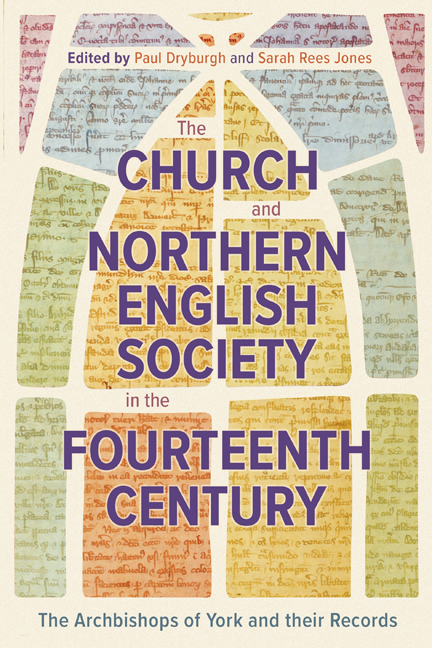 The Church and Northern English Society in the Fourteenth Century
The Church and Northern English Society in the Fourteenth Century Book contents
- Frontmatter
- Dedication
- Contents
- List of Illustrations
- List of Contributors
- Acknowledgements
- List of Abbreviations
- Map: The Ecclesiastical Province of York, c. 1304–1405
- Introduction
- 1 The Administrative Records of the Archbishops of York, 1304–1405
- 2 The Archbishops of York and the Government of Fourteenth-Century England
- 3 Support or Scourge? Archbishop William Melton and the Tradition of Loyal Opposition to the English
- 4 Beyond the Border: The Influence of York Clerks in the Two Edwards’ Scottish Administrations, 1332–1357
- 5 Responding to Royal Requirements: Clerical Taxation in the Province of York, 1304–1405
- 6 Ad insolenciam ipsius rebellis salubrius reprimendam: William Thorntoft, the Abbey of Rufford and Significations of Excommunication in the Northern Province
- 7 Blood, Sex and Holy Water: Reconciling Churches and Churchyards in the Medieval Diocese of York
- 8 Structuring Episcopal Authority: Palaces and Residences of the Archbishop of York
- 9 Medieval Parks of the Archbishops of York
- 10 Northern Ways? Pilgrimage, Politics and Piety in the Fourteenth-Century Administrative Records of the Archdiocese of York
- 11 Underexplored Sources for Gender History: New Approaches to the Fourteenth-Century York Archbishops’ Registers
- 12 Joan of Leeds and other Apostate Nuns in the Province of York, 1300–1350
- Bibliography of Records of the Archbishops of York, 1304–1405
- Index
11 - Underexplored Sources for Gender History: New Approaches to the Fourteenth-Century York Archbishops’ Registers
Published online by Cambridge University Press: 17 May 2024
- Frontmatter
- Dedication
- Contents
- List of Illustrations
- List of Contributors
- Acknowledgements
- List of Abbreviations
- Map: The Ecclesiastical Province of York, c. 1304–1405
- Introduction
- 1 The Administrative Records of the Archbishops of York, 1304–1405
- 2 The Archbishops of York and the Government of Fourteenth-Century England
- 3 Support or Scourge? Archbishop William Melton and the Tradition of Loyal Opposition to the English
- 4 Beyond the Border: The Influence of York Clerks in the Two Edwards’ Scottish Administrations, 1332–1357
- 5 Responding to Royal Requirements: Clerical Taxation in the Province of York, 1304–1405
- 6 Ad insolenciam ipsius rebellis salubrius reprimendam: William Thorntoft, the Abbey of Rufford and Significations of Excommunication in the Northern Province
- 7 Blood, Sex and Holy Water: Reconciling Churches and Churchyards in the Medieval Diocese of York
- 8 Structuring Episcopal Authority: Palaces and Residences of the Archbishop of York
- 9 Medieval Parks of the Archbishops of York
- 10 Northern Ways? Pilgrimage, Politics and Piety in the Fourteenth-Century Administrative Records of the Archdiocese of York
- 11 Underexplored Sources for Gender History: New Approaches to the Fourteenth-Century York Archbishops’ Registers
- 12 Joan of Leeds and other Apostate Nuns in the Province of York, 1300–1350
- Bibliography of Records of the Archbishops of York, 1304–1405
- Index
Summary
In the past much scholarship based on diocesan registers concentrated on what their records revealed about the lives and careers of male clergy. The voluminous entries concerning institution, induction and/or collation to ecclesiastical benefices, together with the fullness and continuous nature of the ordination lists in some registers, allowed the analysis of clerical recruitment patterns and qualifications. David Lepine used the information concerning institutions of canons to examine the relative influence of pope, king, bishop or exchange over the making of appointments. Kathleen Major asked how resignation deeds contained within the episcopal registers for Lincoln diocese can inform us about the personal history of the clergy. Gordan Dunstan has identified trends of increasing parochial stability in Exeter diocese by using the information in Bishop Lacy’s register to trace changes in the number of exchanges of benefice. These studies (and many more) have all used episcopal registers for qualitative and quantitative research with a focus on the details pertaining to the male clergy, who were the central figures in the registers.
Nevertheless, although created within an almost exclusively male environment and worldview, episcopal registers, and the administrative and legal framework in which they were compiled, frequently brought women within their compass. Women were, of course, as much subject to ecclesiastical administration as men, and were, for example, the subject of visitations, patrons of benefices, subject to agreements and disputes relating to marriage and divorce, swearers of oaths (vowesses and anchoresses) and their conduct might be addressed through specific mandates relating to such issues as pregnancy, co-sleeping and their enclosure. While it is important to use these records with care, acknowledging that they will reflect the perspective of the Church, episcopal registers can be read both with and against the archival grain to highlight aspects of secular (and monastic) women’s lives and experiences. The appearance of secular women in episcopal records can reveal much about their roles and positions in medieval society, their relationship with and responsibilities to the medieval Church, their own attitudes and values and how the Church viewed both them and their action.
- Type
- Chapter
- Information
- The Church and Northern English Society in the Fourteenth CenturyThe Archbishops of York and their Records, pp. 268 - 284Publisher: Boydell & BrewerPrint publication year: 2024


